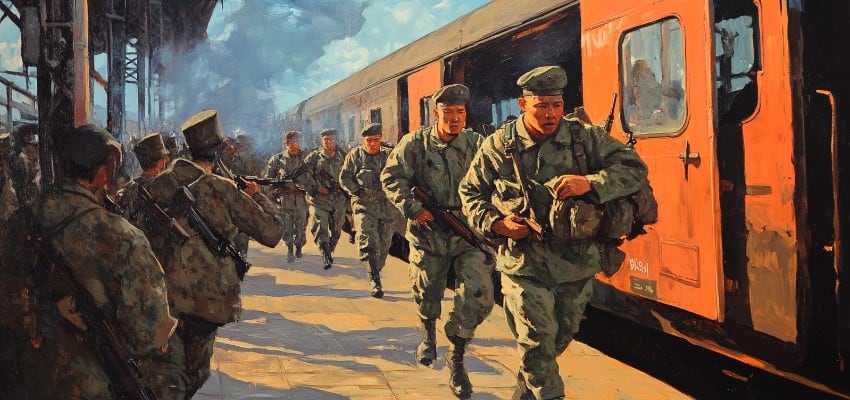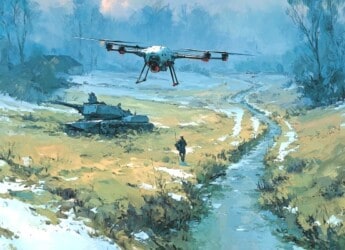Editor’s Note: This report highlights recent developments in the Russo-Ukrainian conflict as of October 25, 2024, covering Russia’s strategic deployment of North Korean forces, intensified offensives in eastern Ukraine, and diplomatic messaging from the BRICS summit. It details Russia’s use of foreign troops, evolving battlefield conditions, and the Kremlin’s portrayal of international alliances amid an ongoing war of attrition with Ukraine.
For those seeking to grasp the full scope of this evolving landscape, the complete updates from the Institute for the Study of War serve as an invaluable resource.
Content Assessment: Russia Prepares to Deploy North Korean Forces as BRICS Diplomacy Supports Kremlin Messaging
Information - 94%
Insight - 92%
Relevance - 91%
Objectivity - 94%
Authority - 95%
93%
Excellent
A short percentage-based assessment of the qualitative benefit expressed as a percentage of positive reception of the recent article from ComplexDiscovery OÜ titled, "Russia Prepares to Deploy North Korean Forces as BRICS Diplomacy Supports Kremlin Messaging."
Background Note: ComplexDiscovery’s staff offers distinctive perspectives on the Russo-Ukrainian war and Iran-Israel conflict, informed by military experience on the West German, East German, and Czechoslovakian border during the Cold War and in Sinai as part of Camp David Accord compliance activities. This firsthand regional knowledge has been further enhanced by recent staff travels to Eastern European countries, including Estonia, Latvia, Lithuania, and Poland. These visits have provided up-to-date, on-the-ground insights into the current geopolitical climate in regions directly impacted by the ongoing conflict.
Combined with cybersecurity, information governance, and eDiscovery proficiency, this multifaceted experience enables comprehensive analysis of these conflicts, including the critical impact of cyber warfare, disinformation, and digital forensics on modern military engagements. This unique background positions ComplexDiscovery to provide valuable insights for conflict-related investigations and litigation, where understanding the interplay of technology, data, and geopolitical factors is crucial.
Russo-Ukrainian Conflict Update*
Russia Prepares to Deploy North Korean Forces as BRICS Diplomacy Supports Kremlin Messaging
ComplexDiscovery Staff
Amid new military escalations and diplomatic maneuvers, Russia prepares to deploy North Korean troops in eastern Ukraine while using recent BRICS discussions to bolster its global support narrative, signaling a complex phase in the Russo-Ukrainian war.
North Korean Troops Poised for Deployment in Russia
Ukrainian President Volodymyr Zelensky on October 25 alerted the international community to Russia’s plan to deploy North Korean troops in support of its military operations. Ukrainian intelligence reports indicate the North Korean units will likely be positioned in Russia’s Kursk Oblast as early as October 27, while Dutch defense officials confirmed an estimated 1,500 North Korean forces are already en route. This marks a critical development as Russia seeks external forces to reinforce its efforts in the contested eastern regions.
Moscow’s recruitment of North Korean troops underscores both its military personnel shortages and a commitment to prolong its campaign despite heavy domestic and battlefield challenges. Officially, North Korean officials stopped short of confirming the deployment, but Vice Foreign Minister Kim Jong Gyu defended potential troop support as lawful, furthering Pyongyang’s alignment with Moscow’s geopolitical stance. For its part, Russia has referred to its recent treaty with North Korea, signed in June, as a foundation for this military collaboration, although the Kremlin remains ambiguous on exact deployments.
Russia’s BRICS Diplomacy Reinforces Domestic and International Messaging
In tandem with military reinforcements, Russia has also leveraged the recent BRICS summit held in Kazan to position itself as a leader of what it terms the “world majority” opposed to Western alliances. Russian state media outlets have amplified Kremlin messaging portraying the BRICS alliance as evidence of Russia’s enduring support despite Western sanctions and isolation attempts. According to Russian sources, the Kazan summit reaffirmed growing BRICS influence, signaling to domestic audiences that global support for Russia remains strong.
However, insider reports reveal a more complicated reality, with some BRICS members expressing reluctance to endorse Russia’s actions in Ukraine fully. Although member countries, particularly China and Brazil, discussed peace proposals more favorable to Russia, these discussions reportedly did not yield significant commitments. This divergence illustrates the challenges Moscow faces in transforming symbolic diplomatic support into practical backing.
Battlefield Update: Russian Offensives Intensify in Eastern Ukraine
On the ground, Russia continued its aggressive push in Ukraine’s eastern territories, notably in Kursk, Luhansk, and Donetsk oblasts. Key battlefield updates include:
- Kursk Oblast: Russian forces, supported by anticipated North Korean reinforcements, advanced near Korenevo, while Ukraine continues its defensive efforts. Ukrainian officials countered Russian President Vladimir Putin’s assertion of encircling Ukrainian troops, citing operational freedom and reporting heavy Russian losses in the area.
- Luhansk and Donetsk Oblasts: In a focused eastern campaign, Russian forces pushed along the Kupyansk-Svatove-Kreminna line with some gains reported near Kreminna. Ukrainian forces maintained counterattacks, targeting Russian supply lines and air defenses, thereby impeding Russian advancements in these areas.
- Southern Donetsk: Russian forces focused on areas such as Selydove and Toretsk, pressing Ukrainian defenses. Ukrainian forces mounted counteroffensives around Toretsk and Pokrovsk, regaining positions lost in recent assaults. Ukrainian resistance in these regions emphasizes Kyiv’s ability to contest Russian advancements despite intensive attacks.
Moscow’s Domestic Moves to Bolster Support and Stability
Domestically, the Kremlin is rapidly expanding state-affiliated veterans’ groups, such as the newly created “SVOi” Military Brotherhood, as part of a broader strategy to consolidate support and replace existing veterans’ organizations that have criticized the government’s war strategies. This move reflects the Kremlin’s focus on promoting pro-war sentiments while stifling dissent from groups formerly critical of Russia’s wartime operations.
Russia is also navigating public perception of election influence, with Kremlin spokesperson Dmitry Peskov recently denying any Russian interference in foreign elections. This comes as Moldova and Georgia report Russian interference efforts, adding complexity to the Kremlin’s domestic and international information campaigns.
Geopolitical Implications and International Reactions
The deployment of North Korean troops, if confirmed, will likely escalate international response and potentially heighten sanctions against Moscow and Pyongyang. The BRICS alliance, while largely symbolic, provides a diplomatic buffer Russia could leverage in narratives contrasting itself with the West. However, Moscow’s ongoing reliance on North Korean and domestic militias highlights its recruitment challenges and operational strain on the battlefield.
Putin’s recent statements, including assertions that Western fatigue is fostering a “new reality” around Ukraine, indicate a sustained Russian strategy of outlasting Western support. The Kremlin’s approach to incorporating North Korean forces and projecting unity through BRICS reflects its determination to weather both military and economic challenges.
As Ukraine and Western allies continue to monitor developments, the emerging combination of battlefield tactics and geopolitical alignments presents a complex and evolving conflict, with each new escalation potentially altering the course of international responses and battlefield outcomes.
News Sources
As a leading source for cybersecurity, information governance, and legal discovery insights, including international investigations and litigation, ComplexDiscovery OÜ recognizes the importance of awareness regarding alleged and documented criminal acts, particularly in the context of the Russia-Ukraine conflict. While we, following the lead of the Institute for the Study of War (ISW), do not provide detailed coverage of war crimes in our primary reports, we encourage professionals within the eDiscovery ecosystem to stay informed about these activities. This awareness is crucial for understanding potential future legal actions and responsibilities.
Detailed Reporting with Maps for October 24-25, 2024, from the ISW – Mouseover to Scroll
Russo-Ukrainian Conflict Update - October 25 2024Review the Detailed Reporting and Maps PDF
About the Institute for the Study of War Research Methodology
ISW’s research methodology relies on both primary and secondary sources, enabling researchers to develop a comprehensive understanding of the situation on the ground. In order to analyze military and political developments in any given area, ISW’s research analysts must wholly understand the systems of enemy and friendly forces. They must also understand the population demographics, physical terrain, politics, and history of that area. This lays the analytical foundation for understanding the reasons for particular developments and fulfilling their assigned research objectives. ISW analysts also spend time in places like Iraq, Afghanistan, and elsewhere in order to gain a better understanding of the security and political situation and to evaluate the implementation of current strategies and policies. Our researchers compile data and analyze trends, producing a granular analysis of developments in areas of research, producing an accurate, high-resolution, timely, and thorough picture of the situation. ISW’s research methodology guarantees its success and commitment to improving the nation’s ability to execute military operations, achieve strategic objectives, and respond to emerging problems that may require the use of American military power.
About the Institute for the Study of War
The Institute for the Study of War advances an informed understanding of military affairs through reliable research, trusted analysis, and innovative education. They are committed to improving the nation’s ability to execute military operations and respond to emerging threats in order to achieve U.S. strategic objectives. ISW is a non-partisan, non-profit, public policy research organization.
Learn more, get involved, and contribute today.
Additional Reading
- From Dissent to OSINT? Understanding, Influencing, and Protecting Roles, Reputation, and Revenue
- [Annual Update] International Cyber Law in Practice: Interactive Toolkit
- Data Embassies: Sovereignty, Security, and Continuity for Nation-States
Assisted by GAI and LLM Technologies
* Sourced and shared with direct express permission from the Institute for the Study of War (ISW).
Source: ComplexDiscovery OÜ



























